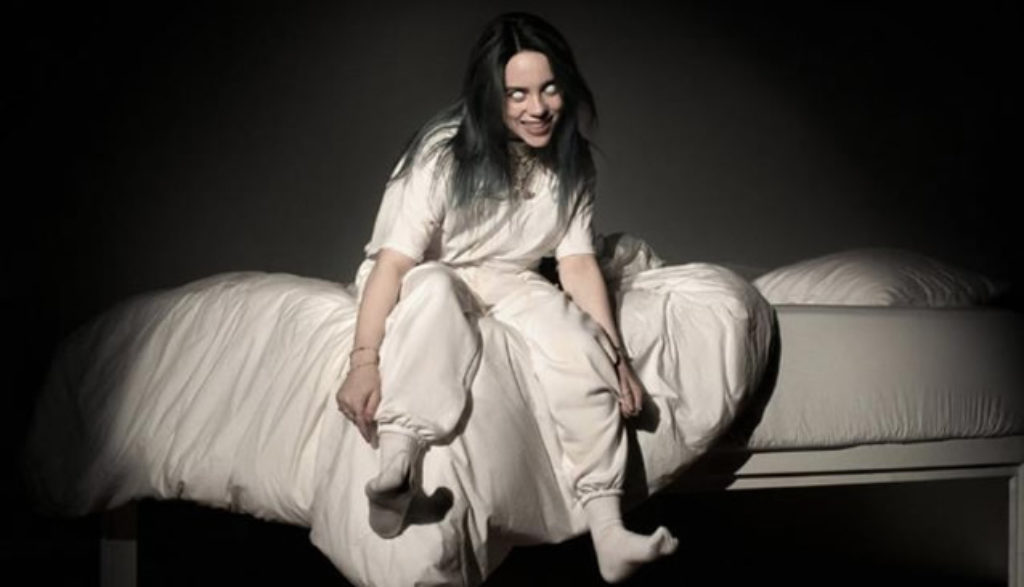
Perhaps no one in 2019 is stirring the musical pot like 17-year-old Billie Eilish. Buzz for this Los Angeles teen has been steadily building since the release of her EP Don’t Smile at Me nearly two years ago. Now she’s back with her official debut album, WHEN WE ALL FALL ASLEEP, WHERE DO WE GO? Early sales reports indicate it may be the second biggest album of the year so far, trailing only Ariana Grande’s thank u, next.
Fusing an incredible range of genres and sounds, Eilish’s haunting vocals here push her mesmerizing style to the next level. Whether you’re attracted or repulsed, there’s no denying this young woman’s talent and the fact that her lyrics are beautiful and enchanting, but problematic and horrifying in equal measure.
In an age in which song lyrics can so often be shallow or sensual, Eilish obviously writes to challenge her listeners—sometimes, jarringly so. She does so by tapping into themes such as love, desire and rejection, as well as disappointment, loneliness and fear, in ways that are both poignant and shocking.
Billie openly shares her fear of rejection in songs such as “I Love You,” “Ilomilo” and “Wish You Were Gay.” In the first of these songs, she relates a vulnerable moment in which someone hesitantly expressed deep love to her—as well as her fear that he might retract that confession: “Maybe you won’t take it back/Say you were trying to make me laugh/And nothing has to change today.” And in the latter song, she longs for a guy she loves to explain why he ended things so abruptly: “I’ll never let you go/Five words you’ll never say/I laugh along like nothing’s wrong/ … I just wanna make you feel OK/But all you do is look the other way.”
In the melancholy song “Ilomilo,” she tries to encourage another guy to stay, singing, “Remember not to get too close to the stars/They’re never gonna give you a love like ours.” Similar sentiments are heard on “When The Party’s Over.”
In “8,” Billie confesses some of the mistakes she made in another apparently failed relationship: “I know you don’t care, but can you listen?/I came committed, guess I overdid it/Wore my heart out on a chain around my neck/But now it’s missin’.”
Much to her credit, Billie takes a strong stand against recreational drug use in “Xanny.” She makes it clear that she’s not interested in the terrible consequences of abusing Xanax: “I don’t need a Xanny to feel better.” She also says she doesn’t want to date anyone who smokes (“Please don’t try to kiss my on the sidewalk/On your cigarette break/I can’t afford to love someone/Who isn’t dying by mistake”). She advises against drugs in “My Strange Addiction,” too.
For all that can be heard as positive here, however, Billie also delves into horror-like territory in quite a few songs.
“Bury a Friend,” for instance, is penned from the perspective of Billie’s personified inner darkness. In it, she talks about the things that have haunted her dreams, such as murder (“Bury a friend, try to wake up”), cannibalism (“Cannibal class, killing the son”), self-mutilation (“Step on the glass, staple your tongue”) and suicide (“Today, I’m thinking about the things that are deadly/ … I wanna end me”). And in the piano ballad “Listen Before I Go,” Billie begs a beau to hear what she has to say before she commits suicide: “If you need me, wanna see me/Better hurry ’cause I’m leavin’ soon.” Similar sentiments are heard in “Goodbye.”
“Bad Guy” winks at sadomasochism as Billie tells a lover she’s fine with being his “animal,” just so long as she gets what she wants in the end: “So you’re a tough guy/… I’m that bad type/Make-your-mama-sad-type/Make-your-girlfriend-mad-type/Might-seduce-your-dad-type.” Likewise in “My Strange Addiction,” Billie admits that a lover is both her pain and her remedy: “Be my reliever, ’cause I don’t self-medicate/And it burns like a gin, and I like it/Put your lips on my skin, and you might ignite it/Hurts, but I know how to hide it, kinda like it.” (Remember, these lyrics are coming from a 17-year-old.)
“You Should See Me in A Crown” is written from the perspective of a ruler who is bent on total dominion (“I’m gonna run this nothing town/Watch me make ‘em bow/One by one by one”) and sadistic torture (“Blood on a marble wall/I like the way they all/Scream”).
In “All the Good Girls Go to Hell,” Billie admits that heaven isn’t too appealing as she applauds those whose lack of morality sends them to hell (“My Lucifer is lonely/… Pearly Gates look more like a picket fence/Once you get inside ’em/Got friends but can’t invite them/ … All the good girls go to hell”). We also hear her sing, “And once the water starts to rise/And heaven’s out of sight/She’ll want the devil on her team.”
“Wish You Were Gay” finds Billie wishing her latest rejection was the result of a guy’s preference for men: “To spare my pride/To give your lack of interest an explanation/Don’t say, I’m not your type/Just say that I’m not your preferred sexual orientation.”
Billie accepts a boyfriend’s self-destructive behavior in “Ilomilo.” She uses the word “h—” in multiple songs.
Many of Billie Eilish’s lyrics defy easy categorization into clearly positive or negative content. Which, I’m sure, is exactly the way she wants it.
When Billie seems to admit she’s flirted with suicidal impulses, for example, does she intend to glamorize them? Or is that admission actually something that she intends as a cautionary message, one that she hopes will help listeners in similarly difficult situations? The answers to those questions may well depend upon how a young fan hears these songs. And those moments could likely be heard either way.
Other times, things are a bit more clear-cut. Sometimes, that’s in good ways, such as in Billie’s admirable and clear rejection of drugs. But sometimes, it’s in disturbing ways, such as Billie’s apparent rejection of God. And she’s obviously infatuated with horror, too, both in her dark lyrics and her creepy, eerie videos.
In an interview with Dasding on YouTube, Billie talked what inspires her songs and videos: “My ideas come from the things that have freaked me out. … A lot of like my visuals and stuff are based off of dreams that I’ve had because of the things I’ve seen.”
The influence of those dark dreams is obvious here. As is Billie’s undeniable talent. Her catchy, confessional and well-crafted songs are already drawing a legion of fans who identify with Billie Eilish’s offbeat persona.
But though this inventive young singer may grab the ears and eyes of many, much of what she’s saying needs to be approached with great caution—especially for tweens and teens who are already grappling with depression or suicidal thoughts.


Kristin Smith joined the Plugged In team in 2017. Formerly a Spanish and English teacher, Kristin loves reading literature and eating authentic Mexican tacos. She and her husband, Eddy, love raising their children Judah and Selah. Kristin also has a deep affection for coffee, music, her dog (Cali) and cat (Aslan).